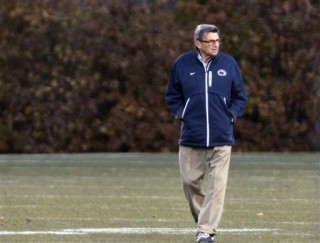
Associated Press
By Teddy Greenstein
McClatchy Tribune
They will bury Joe Paterno today, but the debate will rage for decades. Do you judge a man by his body of work — or by one colossal mistake?
You look at the whole picture, in the same way that Bill Clinton is about more than Monica Lewinsky and Ted Kennedy’s legacy is not reduced to Chappaquiddick.
Fellow coaches and sportswriters agree, but there’s a segment that writes in 140-character bursts that sees it differently. To them I ask: When you’re 6 feet under, should you be eulogized by people whom you never met — or those who actually knew you?
I covered Paterno as a Big Ten football writer but am not swayed by a personal relationship. We didn’t have one. Mostly I’ll remember crowding around Paterno’s table at Big Ten media days, extending my arm to hold my recorder within inches of his mouth. Otherwise you couldn’t understand him.
On weekly Big Ten conference calls this season, someone would ask why Paterno had not settled on a starting quarterback. Often he would reply: “I’m sorry. I just can’t hear you.”
So the reporter would shout: “WHY HAVEN’T YOU NAMED MATT McGLOIN THE FULL-TIME STARTER?”
Paterno, with that great head of hair, never looked like he was in his 80s. But he acted like he was.
One time I asked Northwestern coach Pat Fitzgerald what he and Paterno talked about on the field before games.
“He makes fun of me,” Fitzgerald replied.
About what?
“Mostly for being Irish,” he said.
Paterno also once told Wisconsin coach Bret Bielema how great it was to have met his wife. Bielema’s not married. Turns out Paterno had confused him with Minnesota coach Tim Brewster.
Regardless of the aging effect, Paterno’s response to the Jerry Sandusky allegations was feeble.
But if we were to construct a pie chart of blame, Sandusky gets the biggest piece. Then come former university officials Gary Schultz, Graham Spanier and Tim Curley. Those three were Penn State administrators, responsible for handling crises. They failed Sandusky’s alleged victims, they failed their school and they failed Paterno.
He was a football coach.
“The greatest in the history of the game,” Ohio State’s Urban Meyer said during an interview with BTN.
Paterno won more FBS games and bowl games than anyone. He never committed a major NCAA violation.
He donated at least $4 million to Penn State. He was fiercely loyal to the school. He didn’t use the NFL as leverage and didn’t have a “Les Miles clause” stipulating he would make $1,000 more than any coach in his conference if he won a national championship.
He coached because it was his life. By insisting his players go to class and graduate — decades before the NCAA instituted requirements — he helped hundreds of them. That’s a true benefit to society.
Paterno, meanwhile, was so ignorant of technology that he thought what teenagers did incessantly was called “tech” messaging. But he was forward-thinking enough to push for Big Ten expansion and a conference title game while the Big Ten’s younger coaches initially resisted.
Some Paterno flaws were exposed long before his final few months. He created a culture of secrecy, cutting off media and fans, as if he were a monarch who didn’t have to answer to anyone.
Recruiting guru Tom Lemming of CBS Sports Network told me he has visited 119 of 120 FBS schools. Penn State is the exception. Paterno used to think it appropriate to hide the list of players forming his incoming freshman class. Why? Who knows?
The shame in Paterno’s passing now at age 85 is two-fold. We’ll never get an adequate answer as to why he failed to follow up on the concerns that Sandusky was a molester. And perhaps Paterno would have dedicated his remaining days to helping victims of sexual abuse.



